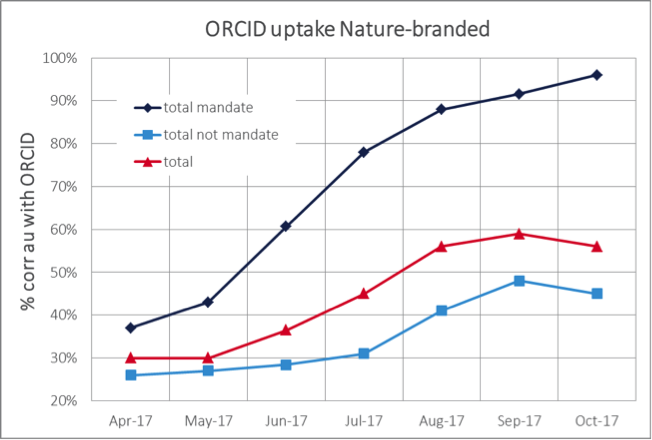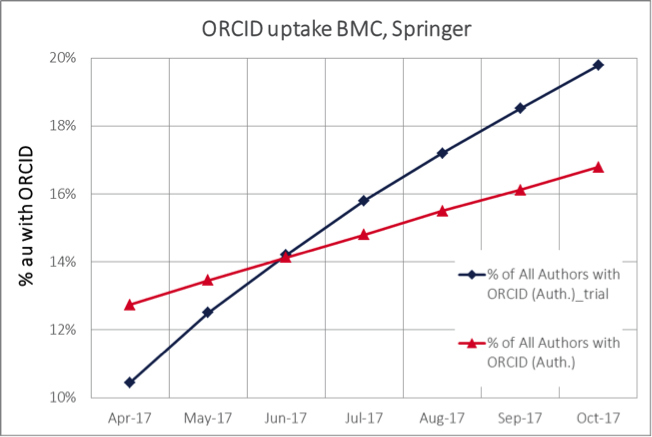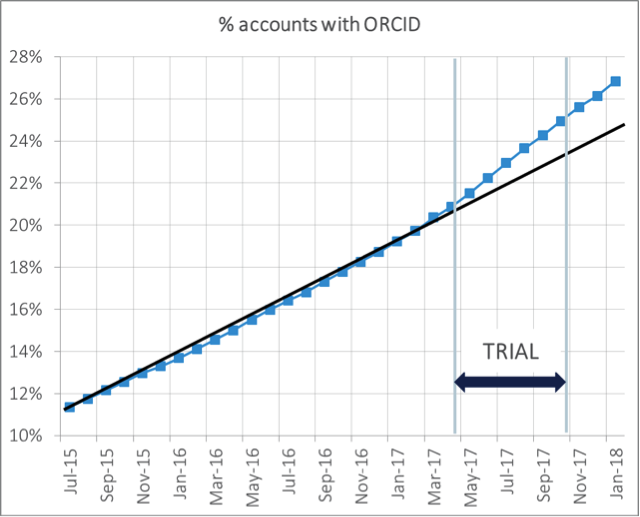This post was co-authored by Elisa De Ranieri (Head of Editorial Process and Data Analytics, Nature Journals) and Alison Mitchell (Chief Publishing Adviser, Springer Nature, and ORCID Board member)
Springer Nature was one of the founding members of ORCID, and since 2012 we have encouraged our authors to submit verified ORCID identifiers and we display them on published papers. This ensures authors get credit for their publications, and contributes to improving the transparency of scholarly communication by disambiguating name homonyms. To further support the uptake of ORCID, in 2017 Springer Nature engaged in a trial mandating ORCID identifiers for corresponding authors of primary research manuscripts at 46 journals across our portfolios.
The trial ran from April 27 for 6 months and the mandate was applied at different stages of the manuscript processing: 14 Nature-branded research journals required iDs at acceptance, while 10 BioMed Central (BMC) and 22 Springer journals did so at initial submission. Corresponding authors were able to share their ORCID identifier in the manuscript tracking system (via the ORCID API); without this step the submission would not proceed to the next stage.
A positive outcome
The response from the research communities was a positive one. There were no instances reported of authors who refused to provide an ORCID identifier at acceptance for the 14 Nature-branded journals, and no observable drop in submissions to the BMC and Springer journals participating in the trial that could be related to the mandate.
For the 14 Nature-branded titles, the percentage of corresponding authors on published papers providing an ORCID identifier grew over the course of the trial from 37% to 96% (Fig. 1). We didn’t quite reach 100% compliance, but this was due to technical hiccups rather than authors refusing to comply. As a comparison, for Nature-branded titles that did not take part in the trial this percentage increased from 26% to 45%. This underlies the effectiveness of the trial but also shows that the positive effects of the trial leaked to other Nature titles as general awareness grew.

Figure 1 Fraction of published papers with at least one corresponding authors providing a ORCID identifier as a function of time for the duration of the trial
For the 32 BMC and Springer journals in the trial, it was not possible to track the uptake of ORCID identifiers for corresponding authors separately from contributing authors. However, by comparing the trend in the fraction of authors with an ORCID identifier for journals participating in the trial with that for all other journals, the impact of the trial is evident: the increase in ORCID uptake was 2.5 times faster for journals in the trial (Fig. 2).

Figure 2 Fraction of authors providing a ORCID identifier at initial submission as a function of time for the duration of the trial
The positive impact of the trial on the Nature-branded titles has been quite remarkable. A sharp increase in the rate with which new user accounts on the manuscript tracking systems are linked to ORCID correlates with the start of the trial (Fig. 3).
 Figure 3 Fraction of user accounts on the manuscript tracking systems (MTSs) with a linked ORCID account. The graph includes data from the MTSs of Nature-branded titles and all other journals hosted on www.nature.com. The duration of the trial is indicated by the blue arrow. The black line is a trend line for behaviour prior to the trial start
Figure 3 Fraction of user accounts on the manuscript tracking systems (MTSs) with a linked ORCID account. The graph includes data from the MTSs of Nature-branded titles and all other journals hosted on www.nature.com. The duration of the trial is indicated by the blue arrow. The black line is a trend line for behaviour prior to the trial start
Next steps
Given the success of this initiative, the trial did not end and is still ongoing for the journals that originally took part. In addition, Springer Nature is now looking to extend the mandate to more journals and evaluating whether to experiment with a mandate for contributing authors. It will also be interesting to investigate the differences in attitudes towards a mandate among the various research communities. Improvements in the technical systems and workflows will hopefully reduce the number of issues that might affect the success of a broader mandate.
Researchers are more and more aware of the benefits of using ORCID as a single identifier for all their research output, and they seemed willing to engage with this mandate. Slowly but surely, Springer Nature is on the path to have all of our authors registered with ORCID!
